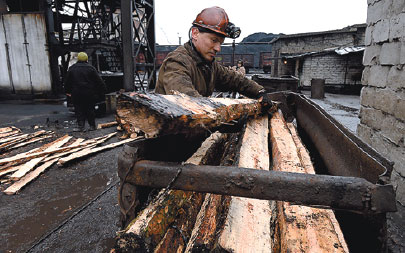Deep below ground, miners work on in east Ukraine
|
A miner works at the Kalinovskaya-Vostochnaya coal mine near Donetsk, Ukraine, on Tuesday. Vasily Maximov / Agence France-Presse |
After an hourlong trek through mine shafts twisting 700 meters below ground level, Yevgeny Kachel lies on his stomach as he plows a drill into a seam of coal.
A few minutes' crawl away, another sweat-drenched miner churns up clouds of thick black dust with a jackhammer.
Just as it has done since work started here 50 years ago, the second shift at the Kalinovskaya-Vostochnaya mine in east Ukraine's Makiivka is getting into its swing.
"It is the most complicated period I've known," said Kachel, 32, his face blackened with dust. "But we still need coal, so we're continuing to work."
The problem is not what's happening at the coal face, but what's taking place hundreds of meters above on the surface.
There, rebels are cementing control of the area after eight months of civil conflict with Ukrainian government forces that has left more than 4,700 people dead.
"Sometimes, down in the mine it can feel easier," a miner named Dmitry said.
As a state-run enterprise, the Kalinovskaya-Vostochnaya mine is in a tricky position. Before the rebellion, it was run by Ukraine. Now, the rebels have declared that the mine is working not for Kiev, but for their self-declared Donetsk People's Republic.
For the miners, the instability has meant they've gone without pay for long stretches - and when money has been handed over, it's been only a portion of what's due.
"We didn't receive our salaries for months," veteran Vladimir Govrilenko said.
Even when they do get their pay, it's difficult for the workers to access it because the banking system is shut down in rebel-held areas.
"They say we've just received some of our pay for October, but I haven't been able to check yet," Govrilenko said.
No other options
Despite the hardship, however, the mine has only shut down for a few days when fighting got too close. The majority of miners have continued to show up for work.
Shift leader Sergei Grishanov said 30 of the 120 miners from this sector have signed up to fight for the rebels, but most of the others are still reporting for work.
"I think everyone has to want to do what they are best at," miner Alexei Popov said. "If we signed up to fight and said let's stop extracting coal, what would happen? How would the power stations work, how would people heat their homes and everything else?"
For those who spend their days underground, there doesn't appear to be any other option but to keep working even after Kiev ordered all government companies in rebel areas to shut down.
"We got a letter telling us that we should stop work and that all state-run enterprises should be moved to areas under Ukrainian control," said safety manager Alexander Gorobtsov after emerging from the mine.
"What were we supposed to do? Pack up the mine and all the deposits and move it across the country?"



















